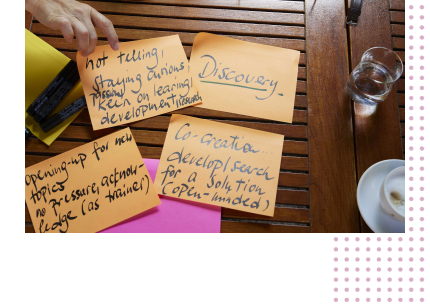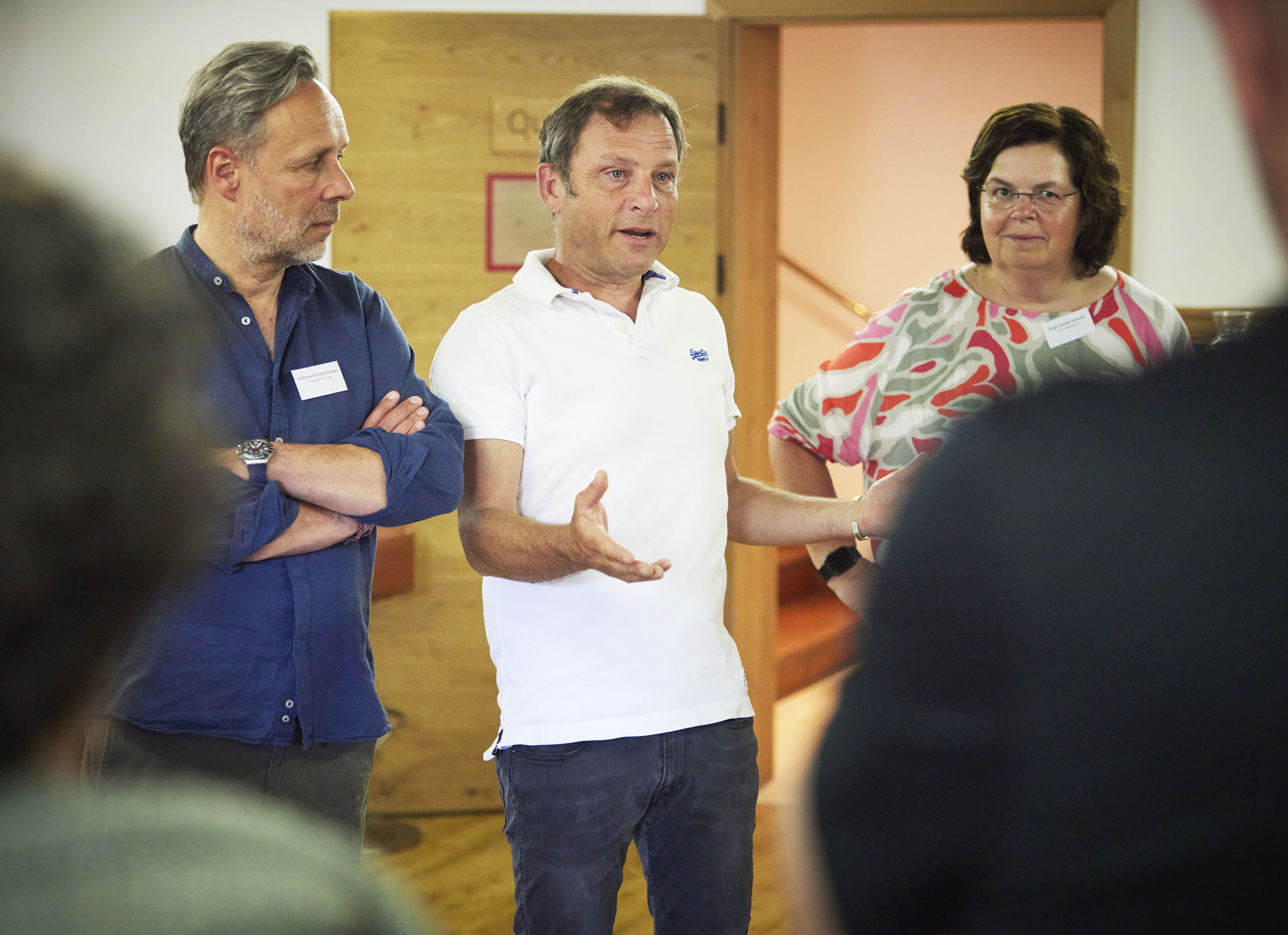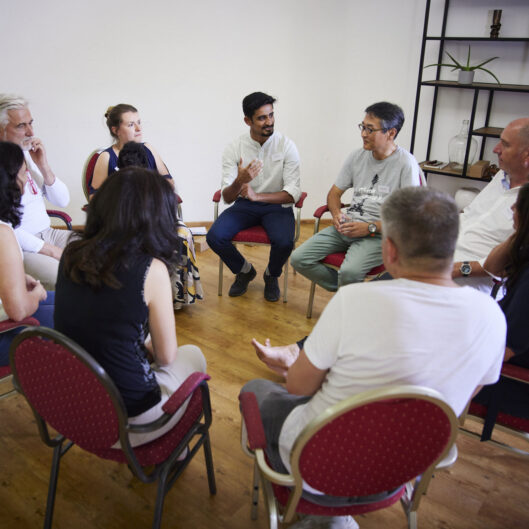
Our range
Our work is evidence-based and is permanently evolving in light of new research. We take a holistic approach to any assignment, which means everything we do for you relates to the wider business and is firmly aligned to what the organisation is looking to achieve. This can be applied to whole organisations, departments, smaller teams or individual projects.
Together with our customers we develop and deliver trainings, workshops and
seminars for leaders and teams. We start our work by taking time to understand
with you together where the organisation is at, zoom out and zoom in, and in
doing so, we provide you with:
- Clarity
- Focus
- Alignment
Together with our customers we develop and deliver trainings, workshops and seminars for leaders and teams. We start our work by taking time to understand with you together where the organisation is at, zoom out and zoom in, and in doing so, we provide you with:
- Clarity
- Focus
- Alignment

Whatever the assignment, be it a full-scale global change program, a consulting project, a development program for managers or 1:1 executive coaching we are always guided by our core values of discovery, humanity and achievement and strive for a trusted partnership with our clients, ensuring we provide sustainable and measurable learnings that meet real business needs. We emphasise the sustainability of interventions and the transfer of ownership to the client.

Whatever the assignment, be it a full-scale global change program, a consulting project, a development program for managers or 1:1 executive coaching we are always guided by our core values of discovery, humanity and achievement and strive for a trusted partnership with our clients, ensuring we provide sustainable and measurable learnings that meet real business needs. We emphasise the sustainability of interventions and the transfer of ownership to the client.
WE DO

Consulting
Organisational Culture
The culture of an organisation is the way how leadership teams and employees interpret and live the company’s values, mission, and vision – every day. Are all employees in your organisation tuned in to the same wavelength? Are your organisation, work force, and resources structured in a way that enables you to achieve your goals? We support you to explore and analyse your organisational culture, as well as to adjust and change it where needed – step by step.
Company mergers, acquisitions, and organisational integration: During company mergers, financial aspects are usually carefully reviewed, and structural and financial modalities for the period after the merger are formulated in great detail. However, after the fusion of two corporate cultures, the anticipated synergies often fail to materialise. In our experience, a thorough analysis of the company cultures is an indispensable prerequisite for a company merger. Through our holistic approach, we can accompany and support you in creating a corporate culture that achieves the desired results by supporting the company’s vision.
Vision And Strategy
Change Management
Organisational Transformation
The classic change can be planned. The solutions are apparent for everyone involved, and it is possible to work towards implementing them in a linear-causal approach. Changes of this kind also trigger emotions and resistance; however, for the persons managing the change, the path and the solution are always visible. An example for this type of change is the restructuring of a business unit or division.
With the second type of change a solution is not apparent for the people inside the organisation, and a linear-causal approach to navigate the change process does not work. Often the prevailing view within the organisation is: “We are already giving everything, and it is still not enough. Something must change, but we don’t know what!” We call this type of change “Organisational Transformation”.
At Coverdale, we can support you to understand whether you are going through an organisational transformation and to equip leadership and teams with the needed skills to navigate a transformation journey successfully.
Organisational Needs Assessment or Diagnostics
Organisational diagnostics are an aid for successfully planning and implementing change processes. They analyse the state of the organisation and thus pinpoint both the need for and the willingness to change. Organisational diagnostics enable a precise picture of the organisation and the identification of leverage points for intervention planning. They provide the basis for an organisational development that seeks to renew and enhance the organisation through change processes. The results help to select suitable approaches and offer possibilities for evaluation to enable validation of intervention success.
Skills:
Continuing development of process, social, and personal skills is essential for the sustainable success of organisations. Coverdale offers a variety of diagnostic methods to determine the status quo of competencies of verticals, departments or in the entire organisation. The result serves as a solid basis for the planning and implementation of targeted measures for the development of new competencies and skills.
Leadership Transition
Changes at the senior leadership level are often accompanied by challenging dynamics across the organisation. The transition to a new leadership style can impact organisational culture and lead to energy drains across all levels.
We offer support before, during, and after leadership transitions, working with the senior leadership team to navigate this change with clarity and foresight.

Training
Leading Projects To Success
With every change an organisation undergoes, working in projects becomes increasingly important. Design and structure of the project can help you achieve the desired results.
In this training you will build skills in project structuring, resource management, result monitoring, and process evaluation in project work; as well as learn how to design change projects.
Successful Cooperation
Well-functioning cooperation between employees, departments, and divisions guarantees that companies are flexible and effective on the long-term. Social competencies regulate the interaction with each other and are the lubricant in collaboration. Process competencies serve to work effectively and efficiently towards common goals.
In this training, you will learn simple, very effective management tools of cooperation through practical application.
Inter-Cultural Cooperation
Working in a culturally diverse team – be it ethnic, generational, or organisational difference in culture – can be a challenge to efficiency and harmony, and ultimately to motivation and team performance.
In this training, you will learn what values underlie different cultures, how to recognise these, and how to respond pro-actively with the aim to use cultural diversity as a resource for success.
High Performance Teams
One of the common characteristics of consistently high performing teams is that all the individuals who make up the team appear to operate on the same wavelength; to think, to act, seemingly as one.
In this workshop the participants will learn skills and tools to foster a high-performance culture in the team and wider organisation, based on their actual team and organisational culture.
Difficult Conversations
Difficult conversations take place when there is a possibility that at least one side runs the risk of reacting emotionally to the content of the conversation. For example, it could be about delivering bad news, giving critical feedback, or addressing stressful topics for at least one side of the conversation.
In this training, you will learn how to act confidently and level-headedly in difficult conversations. During the training, you can prepare for upcoming situations and reflect on conversations that have been unsatisfactory in the past.
Negotiation
Negotiations are among the most demanding tasks of everyday professional life. Often the line between failure and success is narrow and depends decisively on personal and professional appearance. Insufficient preparation, incorrect formulations or unclear agreements can quickly lead to difficult situations that cost money and weaken your professional position.
In this training, you will learn about the different forms of negotiation. We will show you how to prepare talks consistently and conduct them in a structured way thanks to the four Harvard principles, aiming to reach workable agreements cooperatively. You will experiment with negotiation cases and learn how to make negotiations a win-win situation for both sides.
Conflict Management
Conflicts and the right way to deal with them should be part of everyday life in a company. Handled correctly, they release energy that promotes rather than hinders team cooperation. It is essential to recognise conflicts in time, to deal with them promptly, and to find solutions for the problem that has arisen.
This training was designed especially for beginners in conflict resolution. You will learn to recognise conflicts, analyse them correctly, assess them and deal with them so that all sides can agree to a common solution.
Leadership
Leadership means assuming responsibility for actions that make a difference as well as providing direction and orientation. Thus, leadership is key to ensuring the sustained future success of an enterprise and creating conditions under which all levels of the enterprise can actively contribute to this goal. How do you equip your people with the skills and confidence to lead themselves and others in pursuit of your organisation’s vision and goals?
Our Leadership Development workshops provide your managers and leaders with skills to lead themselves, their teams, and the organisation with legitimate confidence such as setting unambiguous aims, planning, reviewing to improve, observation, listening to understand, delegation, giving and receiving feedback, motivating others, gaining commitment, negotiation and managing conflict, fostering creativity and building on ideas.
Leading Self and Leading Others
This seminar provides leaders with a space to de-accelerate and a framework for deep reflection on their own leadership focus, style and attitude. Individually and as a peer group, participants explore the role of resilience in leadership, and become aware of their personal and systemic resources. They develop their coaching attitude and -skills as well as clarity on where and how to use coaching as a leadership practice. Guided mindfulness exercises and a creative exploration of their personal vision connect the different aspects of leadership to an integral toolbox for leading self and leading others.
Coverdale Learning Company
The Coverdale Learning Company is an organisation developed by the participants during a seminar, where the main purposes are to generate leadership know-how and provide participants, in a variety of roles, reflection opportunities with regard to leadership on the basis of experiential learning. Responsibility for the learning process and the content rests primarily with the participants. In this process, the trainers act as consultants and coaches.
The Coverdale Learning Company offers participants a learning and experiential space that they predominantly structure themselves, and which in terms of organisation, roles and tasks reflects the participants’ actual business situation. It is the responsibility of the participants to initiate and structure their leadership, goal-attainment, and cooperation process themselves. The participants explore topic areas by means of experiential learning. Their actions and the resulting effects enable them to experience successes – or failures – from which they learn by reflecting on a leadership situation as they experienced it. Additionally, the consultants provide participants with explanatory models and advanced action options, methods, and leadership knowledge.
Process Facilitation
We understand facilitation as the support of groups to make the best use of all resources. This support usually takes place at the process level. Facilitators provide groups with methods, tools, and skills that enable the other group members to focus on the content of the task.
In this training, you will learn how to facilitate meetings and workshops in a way that helps groups achieve the desired outcome. We focus on facilitation settings for meetings using analogue and electronic facilitation tools.
Agile Mindset
Agility is an attitude, not a method or tool. It does not start with implementing a method but by rethinking your beliefs and changing your mindset.
The starting point for an organisation to become more agile is to develop an agile mindset. For leaders who want to be successful in increasingly agile contexts, it is necessary to abandon routines and create new ones. Our brain can critically rethink and change ingrained thought patterns – throughout our lives.
In this training, you will explore your values and beliefs and learn what it takes to succeed in complex contexts and develop an agile mindset.

Coaching
Overview
We coach individuals as well as teams – depending on the situation.
At Coverdale, we understand coaching as a professional method that relates to a business context and serves to optimise personal as well as professional competence.
The aim of the coaching sessions is to strengthen existing strengths and support the client – whether an individual or a team – to further develop their skills. Perception, experience, and behaviour of the client gain in quality and depth to enable them to better live up to their role and responsibilities in the organisation.
We don’t offer blueprints for solutions, or act as advisors, but rather support the client throughout the coaching process to develop their own insights and solutions. In this, the role of the coach is that of an independent consultant and competent feedback provider. The coach supports the client to recognise potential and use it optimally.
Some general coaching areas we offer are:
- Executive Coaching
- Transition Coaching
- Systemic Coaching
- Team Coaching
- Inter-Cultural Coaching
- Agile Coaching
Individual Coaching
There are many occasions when individual 1:1 coaching is appropriate, often as part of other development or consulting programs. Our coaches work mostly with high performing leaders or high potentials to support them in specific parts of their development journeys.
Some examples are:
- To prepare a high potential manager to take on a more senior role with more leadership responsibility, or to move to a new functional area, a different business unit or a culture.
- To develop specific skills with leaders who are facing a major change initiative, difficult conversations, negotiation, or conflict.
- To support leaders in managing stress, maintaining performance, or to break out of behavioural or thinking patterns that are becoming a hindrance to realise their potential as a leader.
Team Coaching
Especially senior leadership teams as well as high-stake project teams or departments benefit from team coaching as a tool to support them to develop or maintain a team culture conducive to their responsibilities and goals. It also enables them to become aware of the strengths of the team, as well as potential blind spots or areas of development.
Some examples are:
- To coach a leadership team through the transition phases after an acquisition, merger, or leadership change that entail major cultural changes for an organisation.
- To coach a newly formed team in a new department, business unit or a major project, to support an accelerated set-up of the team, and ensure high-quality results.
- To coach underperforming teams into developing the skills and strengths present in the team and its ecosystem into a high-performance team.
Coach cross-functional teams in a Matrix-Organisation to recognise and dissolve silos, integrate and align to work together, and get things done.
Lego Serious Play
Using play as a tool for people to connect – to their capacity to introspect, to their emotions and intuition, to their ideas and potential as well as to each other – has always been a powerful part of Coverdale’s experiential approach to learning, coaching and consulting. We are excited to share that our toolbox has another amazing tool to deepen and widen the way we can play together: Our consultant Elvira is now a Certified Facilitator of LEGO®️SERIOUS PLAY®️ Method and Materials. Whether for defining your organisational vision, co-creating a framework for collaboration within a team or project, building a model of your dream office space, or exploring your future possibilities in 1:1 coaching – this structured approach of using LEGO® blocks as a 3-D printer of our thoughts, ideas and feelings is something we are tremendously looking forward to integrating into our shared journey of learning and developing! Contact elvira.klein@coverdale.in if you are curious to know more!

Consulting
Organisational Culture
The culture of an organisation is the way how leadership teams and employees interpret and live the company’s values, mission, and vision – every day. Are all employees in your organisation tuned in to the same wavelength? Are your organisation, work force, and resources structured in a way that enables you to achieve your goals? We support you to explore and analyse your organisational culture, as well as to adjust and change it where needed – step by step.
Company mergers, acquisitions, and organisational integration: During company mergers, financial aspects are usually carefully reviewed, and structural and financial modalities for the period after the merger are formulated in great detail. However, after the fusion of two corporate cultures, the anticipated synergies often fail to materialise. In our experience, a thorough analysis of the company cultures is an indispensable prerequisite for a company merger. Through our holistic approach, we can accompany and support you in creating a corporate culture that achieves the desired results by supporting the company’s vision.
Vision And Strategy
Change Management
Organisational Transformation
The classic change can be planned. The solutions are apparent for everyone involved, and it is possible to work towards implementing them in a linear-causal approach. Changes of this kind also trigger emotions and resistance; however, for the persons managing the change, the path and the solution are always visible. An example for this type of change is the restructuring of a business unit or division.
With the second type of change a solution is not apparent for the people inside the organisation, and a linear-causal approach to navigate the change process does not work. Often the prevailing view within the organisation is: “We are already giving everything, and it is still not enough. Something must change, but we don’t know what!” We call this type of change “Organisational Transformation”.
At Coverdale, we can support you to understand whether you are going through an organisational transformation and to equip leadership and teams with the needed skills to navigate a transformation journey successfully.
Organisational Needs Assessment or Diagnostics
Organisational diagnostics are an aid for successfully planning and implementing change processes. They analyse the state of the organisation and thus pinpoint both the need for and the willingness to change. Organisational diagnostics enable a precise picture of the organisation and the identification of leverage points for intervention planning. They provide the basis for an organisational development that seeks to renew and enhance the organisation through change processes. The results help to select suitable approaches and offer possibilities for evaluation to enable validation of intervention success.
Skills:
Continuing development of process, social, and personal skills is essential for the sustainable success of organisations. Coverdale offers a variety of diagnostic methods to determine the status quo of competencies of verticals, departments or in the entire organisation. The result serves as a solid basis for the planning and implementation of targeted measures for the development of new competencies and skills.
Leadership Transition
Changes at the senior leadership level are often accompanied by challenging dynamics across the organisation. The transition to a new leadership style can impact organisational culture and lead to energy drains across all levels.
We offer support before, during, and after leadership transitions, working with the senior leadership team to navigate this change with clarity and foresight.

Training
Leading Projects To Success
With every change an organisation undergoes, working in projects becomes increasingly important. Design and structure of the project can help you achieve the desired results.
In this training you will build skills in project structuring, resource management, result monitoring, and process evaluation in project work; as well as learn how to design change projects.
Successful Cooperation
Well-functioning cooperation between employees, departments, and divisions guarantees that companies are flexible and effective on the long-term. Social competencies regulate the interaction with each other and are the lubricant in collaboration. Process competencies serve to work effectively and efficiently towards common goals.
In this training, you will learn simple, very effective management tools of cooperation through practical application.
Inter-Cultural Cooperation
Working in a culturally diverse team – be it ethnic, generational, or organisational difference in culture – can be a challenge to efficiency and harmony, and ultimately to motivation and team performance.
In this training, you will learn what values underlie different cultures, how to recognise these, and how to respond pro-actively with the aim to use cultural diversity as a resource for success.
High Performance Teams
One of the common characteristics of consistently high performing teams is that all the individuals who make up the team appear to operate on the same wavelength; to think, to act, seemingly as one.
In this workshop the participants will learn skills and tools to foster a high-performance culture in the team and wider organisation, based on their actual team and organisational culture.
Difficult Conversations
Difficult conversations take place when there is a possibility that at least one side runs the risk of reacting emotionally to the content of the conversation. For example, it could be about delivering bad news, giving critical feedback, or addressing stressful topics for at least one side of the conversation.
In this training, you will learn how to act confidently and level-headedly in difficult conversations. During the training, you can prepare for upcoming situations and reflect on conversations that have been unsatisfactory in the past.
Negotiation
Negotiations are among the most demanding tasks of everyday professional life. Often the line between failure and success is narrow and depends decisively on personal and professional appearance. Insufficient preparation, incorrect formulations or unclear agreements can quickly lead to difficult situations that cost money and weaken your professional position.
In this training, you will learn about the different forms of negotiation. We will show you how to prepare talks consistently and conduct them in a structured way thanks to the four Harvard principles, aiming to reach workable agreements cooperatively. You will experiment with negotiation cases and learn how to make negotiations a win-win situation for both sides.
Conflict Management
Conflicts and the right way to deal with them should be part of everyday life in a company. Handled correctly, they release energy that promotes rather than hinders team cooperation. It is essential to recognise conflicts in time, to deal with them promptly, and to find solutions for the problem that has arisen.
This training was designed especially for beginners in conflict resolution. You will learn to recognise conflicts, analyse them correctly, assess them and deal with them so that all sides can agree to a common solution.
Leadership
Leadership means assuming responsibility for actions that make a difference as well as providing direction and orientation. Thus, leadership is key to ensuring the sustained future success of an enterprise and creating conditions under which all levels of the enterprise can actively contribute to this goal. How do you equip your people with the skills and confidence to lead themselves and others in pursuit of your organisation’s vision and goals?
Our Leadership Development workshops provide your managers and leaders with skills to lead themselves, their teams, and the organisation with legitimate confidence such as setting unambiguous aims, planning, reviewing to improve, observation, listening to understand, delegation, giving and receiving feedback, motivating others, gaining commitment, negotiation and managing conflict, fostering creativity and building on ideas.
Leading Self and Leading Others
This seminar provides leaders with a space to de-accelerate and a framework for deep reflection on their own leadership focus, style and attitude. Individually and as a peer group, participants explore the role of resilience in leadership, and become aware of their personal and systemic resources. They develop their coaching attitude and -skills as well as clarity on where and how to use coaching as a leadership practice. Guided mindfulness exercises and a creative exploration of their personal vision connect the different aspects of leadership to an integral toolbox for leading self and leading others.
Coverdale Learning Company
The Coverdale Learning Company is an organisation developed by the participants during a seminar, where the main purposes are to generate leadership know-how and provide participants, in a variety of roles, reflection opportunities with regard to leadership on the basis of experiential learning. Responsibility for the learning process and the content rests primarily with the participants. In this process, the trainers act as consultants and coaches.
The Coverdale Learning Company offers participants a learning and experiential space that they predominantly structure themselves, and which in terms of organisation, roles and tasks reflects the participants’ actual business situation. It is the responsibility of the participants to initiate and structure their leadership, goal-attainment, and cooperation process themselves. The participants explore topic areas by means of experiential learning. Their actions and the resulting effects enable them to experience successes – or failures – from which they learn by reflecting on a leadership situation as they experienced it. Additionally, the consultants provide participants with explanatory models and advanced action options, methods, and leadership knowledge.
Process Facilitation
We understand facilitation as the support of groups to make the best use of all resources. This support usually takes place at the process level. Facilitators provide groups with methods, tools, and skills that enable the other group members to focus on the content of the task.
In this training, you will learn how to facilitate meetings and workshops in a way that helps groups achieve the desired outcome. We focus on facilitation settings for meetings using analogue and electronic facilitation tools.
Agile Mindset
Agility is an attitude, not a method or tool. It does not start with implementing a method but by rethinking your beliefs and changing your mindset.
The starting point for an organisation to become more agile is to develop an agile mindset. For leaders who want to be successful in increasingly agile contexts, it is necessary to abandon routines and create new ones. Our brain can critically rethink and change ingrained thought patterns – throughout our lives.
In this training, you will explore your values and beliefs and learn what it takes to succeed in complex contexts and develop an agile mindset.

Coaching
Overview
We coach individuals as well as teams – depending on the situation.
At Coverdale, we understand coaching as a professional method that relates to a business context and serves to optimise personal as well as professional competence.
The aim of the coaching sessions is to strengthen existing strengths and support the client – whether an individual or a team – to further develop their skills. Perception, experience, and behaviour of the client gain in quality and depth to enable them to better live up to their role and responsibilities in the organisation.
We don’t offer blueprints for solutions, or act as advisors, but rather support the client throughout the coaching process to develop their own insights and solutions. In this, the role of the coach is that of an independent consultant and competent feedback provider. The coach supports the client to recognise potential and use it optimally.
Some general coaching areas we offer are:
- Executive Coaching
- Transition Coaching
- Systemic Coaching
- Team Coaching
- Inter-Cultural Coaching
- Agile Coaching
Individual Coaching
There are many occasions when individual 1:1 coaching is appropriate, often as part of other development or consulting programs. Our coaches work mostly with high performing leaders or high potentials to support them in specific parts of their development journeys.
Some examples are:
- To prepare a high potential manager to take on a more senior role with more leadership responsibility, or to move to a new functional area, a different business unit or a culture.
- To develop specific skills with leaders who are facing a major change initiative, difficult conversations, negotiation, or conflict.
- To support leaders in managing stress, maintaining performance, or to break out of behavioural or thinking patterns that are becoming a hindrance to realise their potential as a leader.
Team Coaching
Especially senior leadership teams as well as high-stake project teams or departments benefit from team coaching as a tool to support them to develop or maintain a team culture conducive to their responsibilities and goals. It also enables them to become aware of the strengths of the team, as well as potential blind spots or areas of development.
Some examples are:
- To coach a leadership team through the transition phases after an acquisition, merger, or leadership change that entail major cultural changes for an organisation.
- To coach a newly formed team in a new department, business unit or a major project, to support an accelerated set-up of the team, and ensure high-quality results.
- To coach underperforming teams into developing the skills and strengths present in the team and its ecosystem into a high-performance team.
Coach cross-functional teams in a Matrix-Organisation to recognise and dissolve silos, integrate and align to work together, and get things done.
Lego Serious Play
Using play as a tool for people to connect – to their capacity to introspect, to their emotions and intuition, to their ideas and potential as well as to each other – has always been a powerful part of Coverdale’s experiential approach to learning, coaching and consulting. We are excited to share that our toolbox has another amazing tool to deepen and widen the way we can play together: Our consultant Elvira is now a Certified Facilitator of LEGO®️SERIOUS PLAY®️ Method and Materials. Whether for defining your organisational vision, co-creating a framework for collaboration within a team or project, building a model of your dream office space, or exploring your future possibilities in 1:1 coaching – this structured approach of using LEGO® blocks as a 3-D printer of our thoughts, ideas and feelings is something we are tremendously looking forward to integrating into our shared journey of learning and developing! Contact elvira.klein@coverdale.in if you are curious to know more!
Connect
with us
Connect
with us



